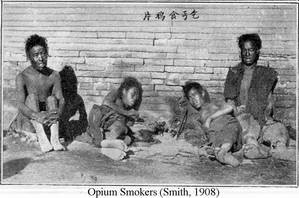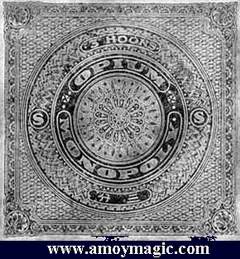 Bill Brown ... Xiamen University
Bill Brown ... Xiamen UniversityProverbs 21:3 "To do what is right and just is more acceptable to the Lord than sacrifice."
The title of "How England Saved China," by John MacGowan (Amoy missionary and prolific author); London, 1913) is ironic. England, after all, forced opium on China at gunpoint through two opium wars, and reduced the country to a state where by 1900 1/4 of adults were opium addicts, and China was literally being divided up by foreign powers--a chunk to Germany, a slice to France, entire provinces to Japan... So how did England "save" China?
MacGowan wrote that England saved China by bringing the Gospel, modern medicine and education, and fighting footbinding. But at what cost? MacGowan describes that as well--quite vividly:
"I have seen a great English steamer march in with a proud and defiant air into a Chinese harbour. The British flag floated lazily at is stern as though it were conscious that the whole of England's might were behind it to defend it should any insult be offered to it. And yet if any flag should blush for very shame, the one I saw that day must have been crimson to its very roots. Its hold was filled with opium-chests, brought from our Indian Empire and protected by English guns and England's bluejackets, to be sold in the country beyond to cast a gloom in many a home there and to wreck many a life. That story in all its ghastliness was an unknown one to the English people, and little did they dream that English honour was being dragged through infinite shame simply to enrich a few thousand opium-sellers and to bring a doubtful revenue to our Indian dependency."
A Warning. Proverbs 21: 13: If a man shuts his ears to the cry of the poor, he too will cry out and not be answered.
Read the excerpts below from MacGowan's book and see if your heart does not grieve for what our countries did a century ago in China, and look around and see if the same thing is not happening today?

The British opium monopoly lasted a century (until 1945 in Hong Kong) because Christians did not take a stand. We impoverished China, enriched ourselves--and then sent a few people to do good deeds and "save" China. We did much the same in other areas of Asia, Africa, South America. And who is being enriched by wars fought today for ostensibly noble purposes but, in reality, to protect trade? And what do we do about it?
At the very end of MacGowan's book, he writes,
"It must not be forgotten that before English missionaries landed in China, English ships flying the English colours had sailed from Indian ports laden with chests of opium, and that later on a long stream of troopships could have been seen rounding the Cape filled with English soldiers to compel the Chinese government to carry out a treaty that had been forced upon them at the cannon's mouth.
"This treaty, signed by English statesmen to the music of maddened guns and with stalwart forms of soldiers dressed in red looking on, with firelocks in their hands, insisted that opium should have a free transit into every province of China. It also demanded in language most imperious, that the Government should put no restrictions on the trade, but that it should stand by, without a sigh and without a tear, whilst its people were being debased by an infamous traffic, that after all was going to enrich but a very small number of the people of England.
"For more than half a century fear of the English guns and of the red-coated soldiers, whose prowess the Chinese knew only too well, stayed the hands of emperors and mandarins, and so the opium spread throughout the Empire.
"It crept in a most mysterious and fascinating manner into the homes of rich and poor, and with its mystic fingers gripped the hearts of old and young. Men became paralysed before this new force, and reason stood silent, and the highest ideals of human life slowly paled and vanished in the presence of this Indian mystery.
"No sentiment was strong enough to face this enemy of the human race. It shattered friendships and defied the most sacred of human affections. Men, blear-eyed and with faces and souls dyed with the opium hue, sold their wives and their little ones, and every article in their homes, till they lay a wreck.
"And what could the noblest of her citizens to do stop the fatal march of their country on the way to destruction? Nothing, for the English treaty was there, with its English signatures, and behind them all the English guns and the English soldiers..."





On the other hand read ‘Foreign Mud’ which gives first hand accounts of the Emperor’s agents taking delivery of opium at the coast from where they then controlled all distribution inside China, as indeed with most trade. So no, Britain was not the only villain here. And yes, we did try to stop foot binding.
ReplyDelete